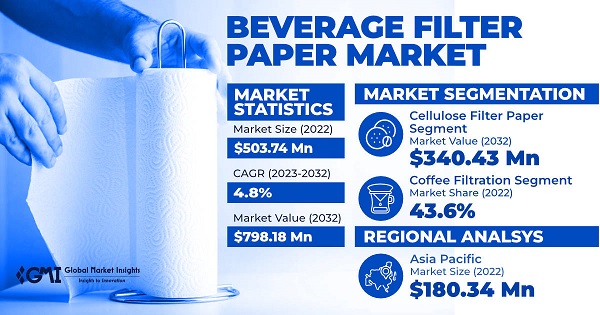Home > Chemicals & Materials > Advanced Materials > Functional Materials > Beverage Filter Paper Market
Beverage Filter Paper Market Size
- Report ID: GMI7109
- Published Date: Oct 2023
- Report Format: PDF
Beverage Filter Paper Market Size
Beverage Filter Paper Market size was valued at around USD 503.74 Million in 2022 and is estimated to reach USD 798.18 million by 2032. The increasing global consumption of various drinks, including as coffee, tea, and alcoholic beverages, as well as the growing trend of premiumization and speciality beverages, are driving demand for beverage filter paper.
Furthermore, increased environmental sustainability consciousness and a desire to decrease single-use plastic waste in the food and beverage industry have resulted in a move toward eco-friendly filter paper products, increasing their use for beverage filtering applications.
| Report Attribute | Details |
|---|---|
| Base Year: | 2022 |
| Beverage Filter Paper Market Size in 2022: | USD 503.74 million |
| Forecast Period: | 2023 to 2032 |
| Forecast Period 2023 to 2032 CAGR: | 4.8% |
| 2032 Value Projection: | USD 798.18 million |
| Historical Data for: | 2018 to 2022 |
| No. of Pages: | 180 |
| Tables, Charts & Figures: | 175 |
| Segments covered: | Type and application |
| Growth Drivers: |
|
| Pitfalls & Challenges: |
|
The beverage filter paper market is expanding rapidly, owing mostly to rising demand for filtered beverages. Consumers are increasingly looking for beverages that are healthier, cleaner, and more refined. This tendency has increased demand for beverage filter papers, which help to improve the taste, clarity, and purity of a variety of beverages, including tea, fruit juices, coffee, and alcoholic beverages. With a rising emphasis on quality and flavor among customers and the foodservice sector, the usage of beverage filter paper to remove pollutants and particles from liquids has become essential, resulting in a significant rise in market revenue.
One of the major challenges limiting revenue growth in the beverage filter paper market is competition from synthetic filter papers. Plastic and polyester are examples of synthetic materials used to make filter sheets. They are frequently less expensive than beverage filter paper and may be reused several times. This makes synthetic filter sheets more appealing to some customers. This competitive issue is forcing beverage makers to seek cost-effective alternatives without sacrificing filtration quality, reducing the market's potential for growth.

